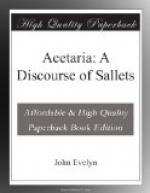It is indeed of Nature more cold and moist than any of the rest; yet less astringent, and so harmless that it may safely be eaten raw in Fevers; for it allays Heat, bridles Choler, extinguishes Thirst, excites Appetite, kindly Nourishes, and above all represses Vapours, conciliates Sleep, mitigates Pain; besides the effect it has upon the Morals, Temperance and Chastity. Galen (whose beloved Sallet it was) from its pinguid, subdulcid and agreeable Nature, says it breeds the most laudable Blood. No marvel then that they were by the Ancients called Sana, by way of eminency, and so highly valu’d by the great [20]_Augustus_, that attributing his Recovery of a dangerous Sickness to them, ’tis reported, he erected a Statue, and built an Altar to this noble Plant. And that the most abstemious and excellent Emperor [21]_Tacitus_ (spending almost nothing at his frugal Table in other Dainties) was yet so great a Friend to Lettuce, that he was us’d to say of his Prodigality, Somnum se mercari illa sumptus effusione. How it was celebrated by Galen we have heard; how he us’d it he tells himself; namely, beginning with Lettuce in his younger Days, and concluding with it when he grew old, and that to his great advantage. In a word, we meet with nothing among all our crude Materials and Sallet store, so proper to mingle with any of the rest, nor so wholsome to be eaten alone, or in Composition, moderately, and with the usual Oxeloeum of Vinegar, Pepper, and Oyl, &c. which last does not so perfectly agree with the Alphange, to which the Juice of Orange, or Limon and Sugar is more desirable: Aristoxenus is reported to have irrigated his Lettuce-Beds with an Oinomelite, or mixture of Wine and Honey: And certainly ’tis not for nothing that our Garden-Lovers, and Brothers of the Sallet, have been so exceedingly Industrious to cultivate this Noble Plant, and multiply its Species; for to name a few in present use: We have the Alphange of Montpelier, crisp and delicate; the Arabic; Ambervelleres; Belgrade, Cabbage, Capuchin, Coss-Lettuce, Curl’d; the Genoa (lasting all the Winter) the Imperial, Lambs, or Agnine, and Lobbs or Lop-Lettuces. The French Minion a dwarf kind: The Oak-Leaf, Passion, Roman, Shell, and Silesian, hard and crimp (esteemed of the best and rarest) with divers more: And here let it be noted, that besides three or four sorts of this Plant, and some few of the rest, there was within our remembrance, rarely any other Salleting serv’d up to the best Tables; with unblanch’d Endive, Succory, Purselan, (and indeed little other variety) Sugar and Vinegar being the constant Vehicles (without Oyl) but now Sugar is almost wholly banish’d from all, except the more effeminate Palates, as too much palling, and taking from the grateful Acid now in use, tho’ otherwise not totally to be reproved: Lettuce boil’d and Condited is sometimes spoken of.




